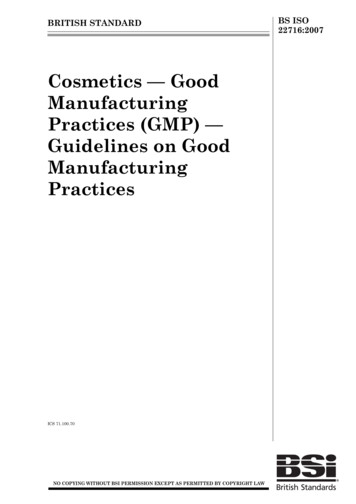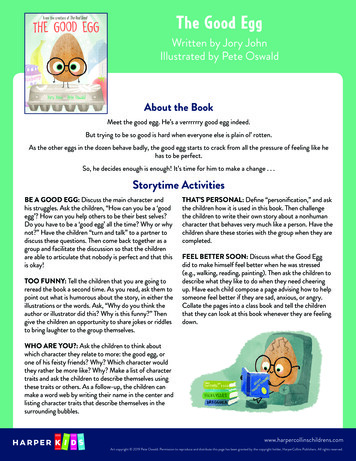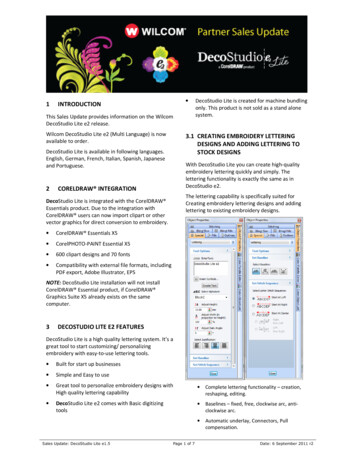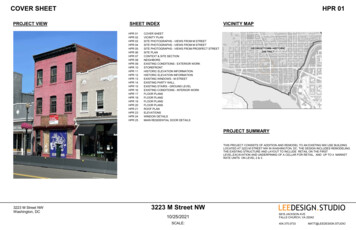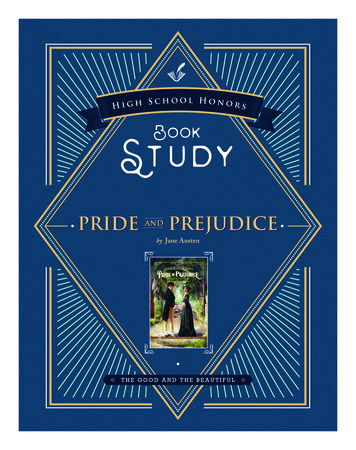
Transcription
/11/198:40 AMCMYCMMYCYCMYKLEVELorem ipsum dolor sit amet, consecteturadipiscing elit, sed do eiusmod temporincididunt ut labore et dolore magna aliqua. Utenim ad minim veniam, quis nostrud exercitationullamco laboris nisi ut aliquip ex ea commodoconsequat. Duis aute irure dolor in reprehenderit involuptate velit esse cillum dolore eu fugiat nullapariatur. Excepteur sint occaecat cupidatat nonSURLGHQW VXQW LQ FXOSD TXL RIÞFLD GHVHUXQW PROOLW DQLP LG est laborum.Lorem ipsum dolor sit amet, consectetur adipiscingelit, sed do eiusmod tempor incididunt ut labore etdolore magna aliqua. Ut enim ad minim veniam, quisnostrud exercitation ullamco laboris nisi ut aliquip exea commodo consequat. Duis aute irure dolor inreprehenderit in voluptate velit esse cillum dolore eufugiat nulla pariatur. Excepteur sint occaecat cupidatatQRQ SURLGHQW VXQW LQ FXOSD TXL RIÞFLD GHVHUXQW PROOLW anim id est laborum.CLEAN LANGUAGE VERSION 10.99ISBN om9 781949 062519by Jane Austen
Book Study — Pride and Prejudice1About the Book StudyWhat are Honors Book Studies?The Good and the Beautiful Honors Book Studies are student-directed consumable booklets that accompany selectbooks from The Good and the Beautiful Library. Each Honors Book Study is designed to help students explore thebook’s themes and messages, appreciate the literary value of the book, and learn new vocabulary and writing skills thatcorrelate with the book. To complete an Honors Book Study, the student simply reads and follows the instructions in thebooklet while reading the corresponding book. The Honors Book Studies are intended to be completed independently, orthey can be completed in a group, class, or book club setting.What are the goals of the Honors Book Studies?There are three main goals of the Honors Book Studies: to help the student learn to analyze, appreciate, and gaininspiration from good and beautiful literature.How many Honors Book Studies should be completed?Students can complete as few or as many of the Honors Book Studies as desired. Honors Book Studies are not designedto take the place of the High School Language Arts courses; they are designed to be used in addition to the courses forthose students who work at a faster pace and can use more challenging work. The reading books for the Honors BookStudies are more challenging than the required reading books for the High School Language Arts courses. Honors BookStudies can be completed in any order.What materials are needed?To complete this book study, you will need the following items: This book study booklet Pride and Prejudice by Jane Austen, available through The Good and the Beautiful Library A computer or laptop with a basic word processing program, such as Word or Google Docs A pencil or pen and a journal or notebookAT-A-GLANCEAuthor Study Biography of Jane AustenVocabulary Challenging vocabulary words in Pride and Prejudice(see pages 4–6)Literary Analysis Study the themes and messages in Pride andPrejudice Analyze the literary value of Pride and PrejudiceWriting Reading and analyzing a response paper Writing a response paper Reading and analyzing an analysis paper Writing an analysis paper General writing instruction and practice
Book Study — Pride and PrejudiceAuthor StudyWho was Jane Austen?2More than 50 years after her death, Austen’s nephewJames Edward Austen-Leigh published her firstbiography—A Memoir of Jane Austen. The book createda renewed interest in Austen and contributed to theincreased sales of her novels, an interest which continuesto this day.Jane Austen was born on December 16, 1775, inSteventon, Hampshire, England, where her father was therector of the parish. The second youngest of eight children,Austen had only one sister, Cassandra, with whom sheenjoyed a close and loving relationship throughout her life.Besides a few years at boarding schools, Austen receivedher education at home. She had complete access to herfather’s extensive home library, and he provided her andher sister with paper and writing materials, which werenot cheap or easy to come by in those days.From an early age, Austen wrote poems, plays, and storiesto amuse herself and her family. She loved to laugh atherself and at the people around her. As such, her earlyworks were often silly and overly dramatic, similar tothe comedic plays her family would perform together intheir barn. As early as age 18, however, Austen’s frivolousscribbles began evolving into more serious, full-lengthnovels. By 1799, at the age of 24, she had completedmanuscripts for Pride and Prejudice, Sense and Sensibility,and Northanger Abbey.“I think I may boast myself tobe, with all possible vanity, themost unlearned and uninformedfemale who ever dared to bean authoress.”—Jane AustenUnfortunately, Austen did not enjoy literary success forvery long. Her first book was not published until 1811(Sense and Sensibility), six years before she died, and noneof her books bore her name in her lifetime. They were“By a Lady” or “By the author of Sense and Sensibility.”She made a respectable profit from most of her books,however, and since she never married, her income helpedrun the meager household she shared with her motherand sister.In the first chapter, Austen-Leigh writes a moving tribute tohis aunt that confirms generations of readers’ suspicionsthat Jane really was as funny and delightful as she seemsin her books. He says, “Of events her life was singularlybarren: few changes and no great crisis ever broke thesmooth current of its course. Even her fame may besaid to have been posthumous: it did not attain to anyvigorous life till she had ceased to exist. Her talents did notintroduce her to the notice of other writers, or connecther with the literary world, or in any degree pierce throughthe obscurity of her domestic retirement. I have thereforescarcely any materials for a detailed life of my aunt; but Ihave a distinct recollection of her person and character;and perhaps many may take an interest in a delineation,if any such can be drawn, of that prolific mind whencesprung the Dashwoods and Bennets, the Bertrams andWoodhouses, the Thorpes and Musgroves, who havebeen admitted as familiar guests to the firesides of somany families, and are known there as individually andintimately as if they were living neighbours. Many maycare to know whether the moral rectitude, the correcttaste, and the warm affections with which she invested herideal characters, were really existing in the native sourcewhence those ideas flowed, and were actually exhibited
Book Study — Pride and Prejudice4Vocabulary Words“Words do two major things: They provide food for the mind and createlight for understanding and awareness.” —Jim Rohnabode [a - BODE]: a habitation or homeMy uncle welcomed us to his abode whenwe pulled into the driveway.acquiescence [ak - we - ES - ence]: a passiveand seemingly content submissionPeter gave his acquiescence, but I still feltnervous borrowing his new car.amiable [AY - mee - uh - bul]: havingor displaying friendly, sociable, orgood-natured qualitiesShe is the most amiable woman; she makesfriends wherever she goes!avarice [AV - uh - ris]: an extreme desire ofgaining and possessing wealth; greedinessYears of avarice turned Ebenezer Scroogeinto a rich but lonely old man.benevolent [be - NEV - uh - lent]: havinga tendency to do good or kind acts;well-meaningScrooge learns to be benevolent andgenerous to those around him.candor [CAN - dor] (British spelling is“candour”): the quality of being open andhonest; frankness; sincerityAnne displays great candor, but sometimesshe hurts others’ feelings by being too blunt.caprice [kuh - PREES]: a sudden change ofopinion or mood; a whimWhen the wedding march began to play, anunexpected caprice seized the bride, andshe ran out of the church.censure [SEN - shur]: the act of blaming orfinding fault and condemning as wrongThe newspapers strongly censured thesenator who had lied under oath.condescend [con - duh - SEND]: to descendfrom the privileges of superior rank ordignity, to do some act to an inferiorThe queen condescended to get out of hercarriage and talk to the commoners.conjecture [con - JEK - shur]: to guess orform an opinion on slight evidenceI conjecture that we will have clear skies forour picnic tomorrow.countenance [COUNT - uh - nance]: theappearance of the faceShe could see goodness shining out of thekind man’s countenance.deign [DANE]: to do something reluctantlythat one considers to be beneath one’sdignity; to stoopThe king did not deign to address the public,sending all messages through his advisors.
Book Study — Pride and Prejudice7SECTION 1Chapters 1–12IntroductionWelcome to the Pride and Prejudice Honors Book Study!You will use this book study as a guide while you readPride and Prejudice, a story full of sly humor and loving,though sometimes frustrating, family relationships.2. I lost my purse in the of everyoneleaving after the concert.3. Parents like to about what theirchildren will be when they grow up.4. The teacher’s stern kept hisstudents in line.5. The woman’s easy and pleasantmade everyone like her.6. George is an man who is kind toeveryone he meets.7. The nicely dressed man was too tosit on the ground at the picnic with everyone else.The goal of The Good and the Beautiful Book Studies isto strengthen both your mind and your heart. This bookstudy is broken into six sections. Complete each sectionas you read the corresponding chapters in the book.Using the book study as a guide will give you a greaterappreciation for the rich language, meaningful messages,and well-developed characters in the story.Mark off the Section 1 activities below as you completeeach one in order. When all four are completed, you areready to begin Section 2.o Complete the Vocabulary activity in this section.o Read “Why Great Literature Endures” (pages 9–10).oRead chapters 1 through 12 of Pride and Prejudice.o Complete the Short Answer Questions in this section.VocabularyWrite the correct word in the blank using the word bankon the following page. Use the vocabulary key on pages4–6 when needed.1. The actress would not to get outof her limo and speak to the adoring crowd.8. Lily is so that she actually told aperfect stranger that he needed a haircut!9. It is of you to always correct yourfriends’ grammar in conversation.10. I’m sorry, what did you say? I was lost in a.11. She was too to bother doing thedishes.12. Do you think the author will toattend our book club?13. Albert Einstein was the mostphysicist of the twentieth century.14. This young woman saved my lifetoday!15. It is your responsibility to obey yourparents’ wishes.
Book Study — Pride and PrejudiceLiterary AnalysisAnalyzing literature can be an eye-opening experience,especially as you compare widely popular books of lowliterary value with “good and beautiful” books. As youlearned in the last section, too often books are chosenby entertainment value alone, but with good analyticalskills, you will be able to draw conclusions for yourself onwhether a book is worth reading.There are several categories to consider when analyzing abook: entertainment value moral value educational value literary valueIt is very common for entertainment value to be placedhigh on the list of importance. However, being entertainedis not the greatest purpose for literature. It’s alsoimportant to recognize that a book can be entertainingin many different ways. There is the instantly gratifying,constantly thrilling type of entertainment, more like avideo game; then there is entertainment that makesyou work for it, diving deep into beautiful descriptions,complex characters, and profound insights, more liketaking a long walk in the woods while looking for a raretype of flower. When you are not used to the latter type ofentertainment, it may take some time and persistence tocome to fully appreciate and enjoy it. If you persist, yourmind and heart will become more cultivated to a deeper,more fulfilling type of entertainment.In Section 1, you read about moral value of literature.The importance of the moral value in books cannot beexaggerated. List some of the moral messages you havealready discovered in Pride and Prejudice:13Educational value is how much the reader learns from thebook. Historical fiction, for example, is frequently used toeducate the reader on a certain time, geographical area,person, and/or event through a story. Not all historicalfiction is equally educational, though. Accuracy and detailplay a big part in the educational value of a book.Finally, the literary value is determined by how well-writtena book is. This can be analyzed by paying attention to thesentence structures, literary devices, descriptive writing,and the author’s ability to create believable characters andengage the reader in the story.Jane Austen’s works have tremendous literary value. Theway she subtly wields her extensive vocabulary; her use ofirony, humor, and other literary devices; and her ability toengage the reader in a complicated social environment withmultifaceted characters all combine to create masterpieces.One important rule in good writing is “Show, Don’t Tell,”which means you should try to immerse your audience inthe world of your writing through descriptive language andcompelling scenes instead of just giving a list of facts. Forexample, Austen doesn’t just tell us that Caroline Bingley isa self-centered, tedious person who loves to hear herselftalk. Instead, she gives us multiple scenes wherein Carolinetaunts Mr. Darcy about his admiration for Elizabeth:He listened to her with perfect indifference while shechose to entertain herself in this manner; and as hiscomposure convinced her that all was safe, her witflowed long.That simple phrase, “her wit flowed long,” says so muchabout Caroline Bingley in so few words. As Shakespearewrote, “Brevity is the soul of wit,” so any wit that flowslong isn’t really wit at all; it’s just a lot of hot air.Let’s analyze other examples of “Show, Don’t Tell” in Prideand Prejudice:Pages 1–3:Think back to the very first scene of the book: theconversation between Mr. and Mrs. Bennet about theBingleys’ arrival at Netherfield Park. It is full of quick,clever quips on Mr. Bennet’s side:“I will send a few lines by you to assure him ofmy hearty consent to his marrying whichever hechooses of the girls;”and lengthy, fretful exhortations on Mrs. Bennet’s side:“Mr. Bennet, how can you abuse your own children
Book Study — Pride and Prejudicein such a way? You take delight in vexing me. You have no compassion for my poor nerves.”We learn so much about who Mr. and Mrs. Bennet are from this brief conversation and get a feel for theirpersonalities and motivations, far more than if Austen had spent time describing what they looked like and howthey were dressed. What impressions do you get about Mr. and Mrs. Bennet’s marriage from this first conversation?Page 71:[T]he agreeable manner in which he immediately fell into conversation, though it was only on its being a wet night,made her feel that the commonest, dullest, most threadbare topic might be rendered interesting by the skill of thespeaker.What do we learn about Mr. Wickham from this first encounter? What do we learn about Elizabeth’s feelings towardhim? Austen could have written, “Mr. Wickham was an interesting speaker, and Elizabeth enjoyed listening to him,”telling us instead of showing. Why is it better to “show” like Austen does, instead of just “tell”?Page 92:She concluded with many good wishes that Lady Lucas might soon be equally fortunate, though evidently andtriumphantly believing there was no chance of it.What do we learn about Mrs. Bennet’s character from this quote? How could Austen have written a similar line, but in away that was “telling” instead of “showing”?Wordy, redundant, or overly flowery writing is not good, but using a variety of sentence lengths and a variety of thefollowing sentence structures helps avoid choppiness and predictability. However, using more complex sentencestructures exercises your brain, giving reading the benefits of increased memory, focus, and attention span. Simple Sentence: consists of only one clause Compound Sentence: consists of two or more independent clauses Complex Sentence: has at least one independent clause, plus at least one dependent clause Compound-Complex Sentence: contains more than one independent clause and at least one dependent clause14
Book Study — Pride and PrejudiceThemes and MessagesConsider what Elizabeth says to her sister Jane on page329: “If you were to give me forty such men, I never couldbe so happy as you. Till I have your disposition, yourgoodness, I never can have your happiness.”It should be clear, now that you have finished Pride andPrejudice, that Austen cares a lot about character, aboutour inner qualities. In the above quote and throughoutthe book, she teaches us that true happiness comes frombeing a good person and doing what is right. As we finishthis book study, something must be said of the unhappyfate of Lydia and Mr. Wickham.You learned in Section 2 about why marriage is such aprominent theme in Austen’s books: marriage affectedevery aspect of a woman’s life in Austen’s time. It is alsotrue of Austen’s time that families were much more closelyconnected in their fates—if one member was dishonored,27the whole family would feel the effects of the shame. Byrunning away with Wickham and living with him beforetheir marriage, Lydia throws shame on her whole familyand significantly decreases her sisters’ chances of marryingwell and achieving financial security later in life.Ponder the following questions and, if possible,discuss them with a parent, teacher, or group.1. On page 291, Elizabeth reflects on “how little ofpermanent happiness could belong to a couple whowere only brought together because their passionswere stronger than their virtue.” Do Lydia and Wickhamget “punished” for their wrong behavior? In what way?2. What does Lydia’s elopement reveal about Mr.and Mrs. Bennet? Do you think either of them arepermanently changed by the event?3. “He owed a good deal in town, but his debts of honourwere still more formidable.” What do we learn aboutRegency-Era society from this quote? What else doesthe book have to say on the subject of “honour”?Writing an Analysis PaperNow that you have read and analyzed an analysis paperon Pride and Prejudice, it’s your turn to write one.Choose one of the following topics for your paper, orchoose your own topic: Jane Austen originally titled this book FirstImpressions. What are some of the “first impressions”that happen in the book, and how do thoseimpressions change over the course of the novel?What does Pride and Prejudice teach us aboutmarriage in the Regency Era specifically and ingeneral? Do you think Austen had a positive or anegative view of marriage?Evaluate the literary or moral value of Pride andPrejudice. Use examples that you have highlightedthroughout the book.Use the example analysis paperand the following checklist to makesure your paper contains all of thenecessary elements of an analysispaper: There is an attention-grabbing opening. Title and author are listed in the opening paragraph. Your thesis statement is in the opening paragraph. There are at least three body paragraphs. Each body paragraph has a topic sentence and sticksto the main idea of the topic sentence. Transitions are used between paragraphs and topics. The concluding paragraph wraps up the text withoutrepeating exactly what has already been stated. The final word count is at least 750 words.
especially as you compare widely popular books of low literary value with "good and beauti ful" books. As you learned in the last secti on, too oft en books are chosen by entertainment value alone, but with good analyti cal skills, you will be able to draw conclusions for yourself on whether a book is worth reading.



